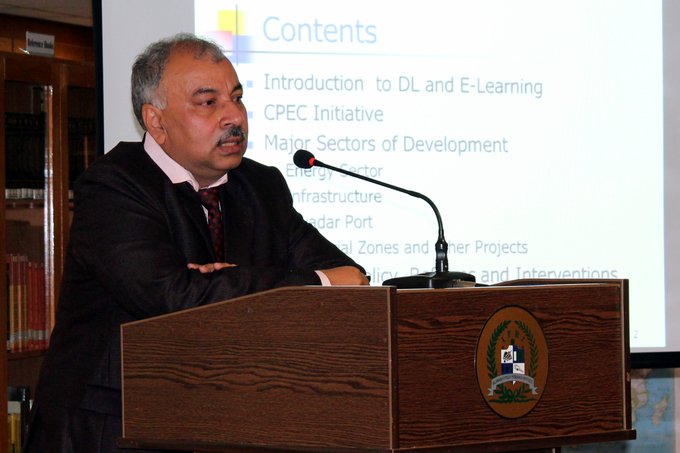Experts suggest utilizing E-Learning Platform for CPEC training and education
Intellectuals and Specialists underscored the necessity of training and education of professionals and labours working on CPEC projects, mainly in the commercial and engineering fields. They suggested designing courses, combining with activities, security procedures, and developing communications skills. The lecture titled 'China-Pakistan Economic Corridor: Prospects of Distance & E-Learning for Human Development' was organised by the Institute of Policy Studies (IPRI). Addressing the participants Former Vice-Chancellor Allama Iqbal Open University, Dr. Nazir Ahmed Sangi stressed that an exclusive faculty with specially allocated CPEC Endowment Funds would be required in both states for the promotion of this agenda through e-learning institutions. He believed that Pakistan is yet to fully reap the benefit of the CPEC, mainly the opportunities in the human development sector. Dr. Sangi stated that Chinese expertise and assistance could be beneficial for Pakistan's E-learning or Distance learning program. He also recommended the revision in the National Education Policy of Pakistan to keep CPEC initiative forward.
ISLAMABAD, (APP – UrduPoint / Pakistan Point News – 11th Dec, 2019 ) :Education experts stressed on Wednesday the importance of China Pakistan Economic Corridor (CPEC) trainings and education, calling for the need to produce dynamic professionals and workers in commercial and engineering disciplines by developing strong processes, linked activities, safety procedures, skills, and communication methods.
Delivering a lecture on ‘China-Pakistan Economic Corridor: Prospects of Distance & E-Learning for Human Development’, former Vice Chancellor Allama Iqbal Open University, Dr Nazir Ahmed Sangi pointed out that focused faculty for e-learning in both countries is required, along with special CPEC Endowment Funds for institutions of learning.
The guest lecture was organized by Islamabad Policy Research Institute (IPRI) here.
Sangi also called for developing strong work ethics and rule-based operations besides high level of monitoring and vigilance for collaborative Pak-China education projects to succeed.
He said there was immense potential for the establishment of distance and e-Learning industry in Pakistan based on international best practices and standards.
Well-planned and joint efforts in HRD in multiple disciplines, at sizable level, at distant locations are needed to develop multicultural, tolerant and skilled manpower, he added.
Dr Nazir Sangi provided an overview of how AIOU broke new grounds in the fields of professional, scientific, and technical education by reaching out to the remotest areas of Pakistan through modern Information Technology.
He said that in far-flung areas like Umerkot, D.G. Khan, Rahim Yar Khan, and Multan state-of-art study centres, with no faculty, were imparting online trainings and education to rural students.
Dr Sangi was of the view that the full potential of CPEC is yet to be understood, especially in terms of its prospects for human development.
‘The bigger picture is that Pakistan has a great deal to learn from this is extensive cooperation with the second largest economy in the world – China. One area Pakistan could benefit from Chinese expertise and assistance in the form of laying out infrastructure, is Distance and e-Learning,’ he stressed.
However, he also urged that the National Education Policy of Pakistan needs to catch up with the CPEC initiative. ‘Pakistan’s education policy needs to be collaborative and innovative, and accommodate DL and e-Learning by following high standards, developing good infrastructure and focused facilities. It needs to be a policy which is multilingual, multicultural and tolerant,’ he advised.
Demonstrating AIOU’s first online Chinese language course modules, he urged that enhancing internet connectivity in far-flung areas can revolutionise distance and e-learning and help equip the Pakistani population with modern skills and knowledge, as well as bridge the digital divide.
Earlier, welcoming Dr Sangi and other guests, Brig. (Retd.) Naveed Ali, Director Administration at IPRI, highlighted that CPEC can contribute significantly Pakistan’s human resource development.
He said that under CPEC, setting up of various optical fiber cables presents an opportune moment for the development of the IT sector of Pakistan which in turn can enhance connectivity.
‘In this regard, one of the main areas that can have an impact is the creation of a robust and reliable E-Learning Network between Pakistan and China’, he stressed.
Chinese envoy Zhao Shiren urges students to uphold integrity and strengthen China-Pakistan ties
LAHORE:The Consul Generals from several countries and other distinguished guests attended …











